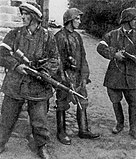| This article includes a list of general references, but it lacks sufficient corresponding inline citations. Please help to improve this article by introducing more precise citations. (March 2013) (Learn how and when to remove this message) |
| Part of a series on the |
| Polish Underground State |
|---|
 History of Poland 1939–1945 History of Poland 1939–1945 |
| Authorities |
|
Political organizations Major parties Minor parties Opposition |
|
Military organizations Home Army (AK) Mostly integrated with Armed Resistance and Home Army Partially integrated with Armed Resistance and Home Army
Non-integrated but recognizing authority of Armed Resistance and Home Army Opposition |
| Related topics |
Państwowy Korpus Bezpieczeństwa (Polish for "National Security Corps", abbreviated PKB; sometimes also called Kadra Bezpieczeństwa) was a Polish underground police force organized under German occupation during World War II by the Polish Home Army and Government Delegation for Poland. It was trained as the core of a future police force for a planned Polish all-national uprising, and for after Poland's liberation. The Corps' first commander was Lt. Col. Marian Kozielewski. He was later replaced by Stanisław Tabisz. In October 1943 the PKB had 8,400 officers; by early 1944 the number had grown to almost 12,000.
The PKB was created by the Department of the Internal Affairs of the Delegate's Office in 1940, mostly from members of the pre-war Polish police and volunteers. PKB carried out investigation and criminal intelligence duties as well as gathered reports of the Gestapo and Kripo in the General Government. It enforced the verdicts prepared by the Directorate of Civil Resistance and Directorate of Underground Resistance and passed by the Underground court.
A unit of PKB commanded by Henryk Iwański purportedly distinguished itself during the Warsaw Ghetto Uprising in 1943. However, according to the work of a Polish-Israeli research team (Dr. Dariusz Libionka and Dr. Laurence Weinbaum), much of what Henryk Iwański wrote should be relegated to the realm of confabulation or manipulation of the Communist secret police.
See also
External links
- Polish Police during World War II (Polish)
References
- Dariusz Libionka & Laurence Weinbaum - Bohaterowie, hochsztaplerzy, opisywacze Wokół Żydowskiego Związku Wojskowego (Warsaw: Stowarzyszenie Centrum Badań nad Zagładą Żydów, 2011). See also: Dariusz Libionka & Laurence Weinbaum: "A Legendary Commander" Haaretz, June 22, 2007. http://www.haaretz.com/weekend/magazine/a-legendary-commander-1.223769